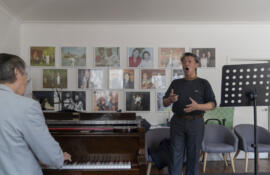Reveka Hurtado’s Venezuelan arepas are just right. They’re fluffy and light, and the cornmeal patty is sturdy enough to hold a healthy portion of meat, cheese, or any number of fillings.
Six years after fleeing persecution in Venezuela, Ms Hurtado has found a way to stay connected to her culture through cooking while she seeks asylum in Australia. She’s been making and selling empanadas, arepas, panes de jamón, and an array of other Venezuelan delicacies for about a year now through Papelón, the bakery business she runs out of her Melbourne home.
“I love to share my culture and my food,” Ms Hurtado says. “It’s a good way to make connections with strangers.
“People need to know who we are, as Venezuelans.”

In her new life in Melbourne, Reveka Hurtado keeps her cultural connections alive with her cooking.
Many Venezuelans are similarly searching for a way to stay connected to their culture. The ongoing political, economic and social crises in Ms Hurtado’s home country have triggered a mass exodus of migrants, mostly to other Latin American countries. It’s described by the UN as the largest displacement in the region’s history, and the most underfunded.
According to the United Nations High Commissioner for Refugees and the International Organisation for Migration, some 5.6 million Venezuelans have left the country since 2015, most recently displaced by the fallout of prolonged COVID-19 lockdowns and loss of livelihoods.
Ms Hurtado was part of the first wave of the exodus, as Venezuela experienced a slow demise of democracy after Hugo Chávez was elected to government in 1999.
“For me, Chávez is why I can’t go back,” Ms Hurtado says.
She’s part of a growing Venezuelan diaspora population in Australia. “Until the 1990s, there were only I think 200 Venezuelans in Australia or something like that,” says Dr Raul Sanchez-Urribarri, a senior lecturer at LaTrobe University specialising in Latin American comparative judicial studies. “Venezuelans went from being 200 to the ten, twelve thousands they might be today, give or take.”
Dr Sanchez-Urribarri says under Chávez’s rule, the government “pretty much abandoned the notion of democratic legitimacy … and progressively embraced the idea of keeping power at all costs”.
He argues Chávez’s election was the start of a gradual deterioration of democracy that has continued under Chávez’s successor, Nicolás Maduro.
The current economic crisis, which according to an International Monetary Fund report has seen Venezuela’s GDP shrink by 80 per cent over the past five years, has sparked an explosion of poverty and crime rates in Venezuela. Food, water, and electricity shortages have become commonplace since 2014.
Ms Hurtado attended a number of anti-government protests at her university in Caracas against Chávez’s increasing authoritarianism. Afterwards, Mrs Hurtado and her family were subject to harassment and threats from pro-Chávez groups. She eventually fled Venezuela for Chile in 2014, and then travelled to Australia two years ago on a student visa.
After her departure, armed men would show up at her family’s home in San Juan de Los Morros demanding to know where she was.
“My mother called me and said, ‘Don’t come home’. Can you imagine if your mother asked you not to come home?” Ms Hurtado says, visibly emotional. “Home is where you should be safe.”
Not all Venezuelans were against Chávez. For many, he was – and still is – a symbol of hope.
“Many people identify, still to this day, as Chavistas [Chávez supporters],” says Dr Luis Angosto-Ferrández, a senior lecturer in the Department of Spanish and Latin American Studies and the Department of Anthropology at the University of Sydney.
“They consider that there was a national project for improvement, salvation, and potential generation of a better world behind what people denominated Chavismo [the ideology of Chávez and his followers].”
During the first decade under Chávez, the government embarked upon a series of projects aimed at increasing quality of life for poorer, rural Venezuelans. Poverty, illiteracy, and infant mortality rates all shrank according to data from the United Nations Economic Commission for Latin America and the Caribbean.
“The idea of redistribution and access to social services drives, still to this day, political demands, even among those who have lost sympathy for the Socialist Party and its representatives,” says Dr Angosto-Ferrández.
Ms Hurtado was granted permanent residence in Chile, but she found herself in a similarly dangerous situation in 2019, when protests erupted over social inequality and demands for the resignation of Chilean president Sebastián Piñera.
“The Chavistas found me again, they threatened me and my family in Chile,” she says. “I knew I had to go somewhere else.”
Ms Hurtado is now seeking asylum in Australia – a process that “can take two, three, four years”. She wishes it was easier for people like her to seek asylum.
“We’re not coming here to live on the street or be homeless. All we want is the chance to work and live a safe life,” she says.
Since coming to Australia, Ms Hurtado has thrown herself into her work, intent on bringing her culture to Australia while she is unable to return to Venezuela.
“We have our own food, our own culture. The Venezuelan arepa is different to the Colombian version!”



